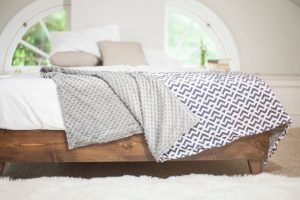 Weighted blankets are great sleep aids for people with anxiety, ADHD, sensory processing disorders, and many other conditions, but can they help sleep apnea sufferers? Yes! Anxiety can be a source of sleep issues, which can coincide with the breathing disorder. Here’s how a weighted blanket can help you get the rest you need.
Weighted blankets are great sleep aids for people with anxiety, ADHD, sensory processing disorders, and many other conditions, but can they help sleep apnea sufferers? Yes! Anxiety can be a source of sleep issues, which can coincide with the breathing disorder. Here’s how a weighted blanket can help you get the rest you need.
What is Sleep Apnea?
Obstructive sleep apnea (OSA) is the most common form of the breathing disorder. An obstruction is created in the airway from your tongue or the soft tissues in the back of your mouth collapsing. This can cause frequent breathing disturbances throughout the night. Each event depletes your body of oxygen and interrupts your sleep cycle. With no treatment, you can face potentially life-threatening complications.
Sleep Peacefully with a Weighted Blanket
A weighted blanket can feel like a hug to help you sleep peacefully. It has an interior lining that evenly distributes weight. The blankets come in many weights, ranging from 4 to 30 pounds.
According to research, the ideal weight for sleep and relaxation is 12-15 pounds. It doesn’t cause excessive pressure or too much heat, so it won’t interfere with your sleep. As your body relaxes, you’ll produce more oxytocin, which can relieve various issues that might keep you awake, like restless leg syndrome.
Weighted blankets also help fight insomnia, lower stress, and increase your overall comfort. Although they are safe for people using a CPAP machine or an oral appliance, they aren’t recommended for patients with untreated sleep apnea.
Choosing the Best Weighted Blanket
It’s important to choose a blanket that’s best for your body weight. Ideally, an adult should use one that is approximately 10% of their body weight. For example, if you weigh 160 pounds, look for a 16-pound blanket. Healthcare professionals recommend using a heavier blanket instead of a lighter option to achieve maximum benefits.
Managing Your Sleep Apnea
A weighted blanket can help you sleep peacefully, but it isn’t a substitute for sleep apnea therapy. A CPAP is the most traditional form of treatment. A mask worn over your mouth or nose delivers pressurized air to prevent breathing disruptions.
As an alternative to a CPAP, patients with mild-to-moderate sleep apnea can benefit from an oral appliance. It moves your tongue and jaw in more comfortable positions to keep your airway open.
With the right treatment and changes at home, you can get quality sleep every night. You’ll manage your sleep apnea to promote your overall wellness and quality of life.
About Dr. Pamela West
Dr. West has over 2 decades of experience helping people of all ages sleep soundly. After earning her dental degree from the University of Southern California Dental School, she has continued her education in various specialties, including sleep medicine. She is a proud member of the American Academy of Sleep Medicine and many other professional organizations. Request an appointment through her website or call (702) 602-4000.
